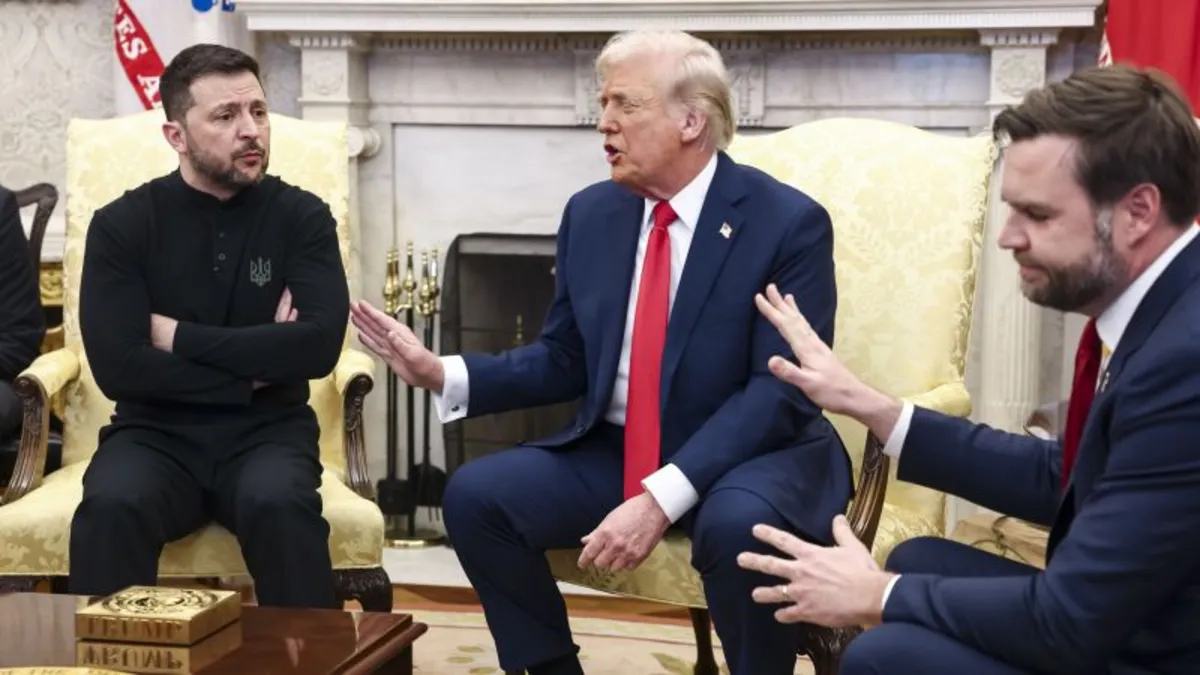
In a recent turn of events, Western leaders are urgently mobilizing their support for Ukraine following a contentious meeting between Donald Trump and Volodymyr Zelensky. This meeting has illuminated the widening rift between Washington and several of its key allies. The tense exchange in the Oval Office underscores the delicate balancing act that many Western capitals face since Trump's return to office in January. They must maintain robust support for Zelensky and Kyiv in their fight against Russian aggression, all while navigating the complexities of dealing with a president who appears increasingly aligned with Vladimir Putin.
On Thursday, UK Prime Minister Keir Starmer met with Trump in what has been described as one of the most challenging visits by a British leader to Washington in decades. Following the heated exchange with Zelensky, Starmer reached out to both leaders, emphasizing his unwavering commitment to support Ukraine. A spokesperson from Downing Street stated that Starmer is dedicated to finding a pathway towards a sustainable peace that respects Ukraine's sovereignty and security. To further this goal, the UK is set to host a summit of European leaders on Sunday, where Zelensky is expected to be in attendance. This gathering promises to offer a more welcoming environment for the Ukrainian leader, as Starmer has cautioned Trump against any peace deals that would favor Russia or its allies.
In light of the recent divisions, Italian Prime Minister Giorgia Meloni, a notable ally of Trump in Europe, has advocated for a summit involving the US and European nations to discuss the ongoing war in Ukraine. Meloni emphasized that disunity weakens the West. Meanwhile, European leaders have expressed their surprise and concern over the significant decline in American support for Ukraine in recent weeks, particularly after three years of steadfast backing under the previous administration led by Joe Biden. Many are puzzled by Trump's apparent shift against Zelensky, raising questions about the concessions made to Putin prior to negotiations.
In response to the troubling dynamics, Zelensky has reached out to various leaders, including French President Emmanuel Macron and European Council President António Costa. Macron reiterated the clear distinction between aggressors and victims, stating, "There is an aggressor which is Russia and an attacked people which is Ukraine." Similarly, German Chancellor Olaf Scholz underscored that nobody desires peace more than the Ukrainians, reaffirming Germany's support for Ukraine's cause. Kaja Kallas, the European Union's foreign policy chief, remarked that the free world requires a new leader to navigate these tumultuous waters, and EU leaders collectively urged Zelensky to remain resilient.
Support for Ukraine is not limited to Europe, as leaders from outside the continent have also voiced their solidarity. Canadian Prime Minister Justin Trudeau declared that Canada would continue to stand by Ukraine, denouncing Russia's illegal invasion. He highlighted the courage and resilience exhibited by Ukrainians in their fight for democracy and sovereignty. Additionally, Australia's Prime Minister Anthony Albanese reaffirmed his country's commitment to support Ukraine "for as long as it takes," echoing sentiments of unity in the struggle for international law.
Back in Ukraine, the exchange with Trump has inadvertently bolstered Zelensky's support among lawmakers, with many rallying behind their leader. Oleksandr Merezhko, the head of the parliament's Foreign Affairs Committee, expressed pride in Zelensky's courage to defend Ukraine, asserting that the parliament would stand united behind him. However, there is a sense of urgency within Ukraine's military, which has been holding back a significantly larger Russian force for over three years with the aid of US and European support. Some military officers have expressed frustration with Trump's negotiating tactics, highlighting the deep concerns regarding any proposed ceasefire that could undermine Ukraine's position.
In conclusion, while the political landscape remains fraught with challenges, Ukraine's leadership and military are determined to continue their fight against Russian aggression. With vocal support from both European and global allies, the call for unity and resilience in the face of adversity is stronger than ever. As the situation evolves, the international community watches closely, hoping for a resolution that honors Ukraine's sovereignty and secures lasting peace.